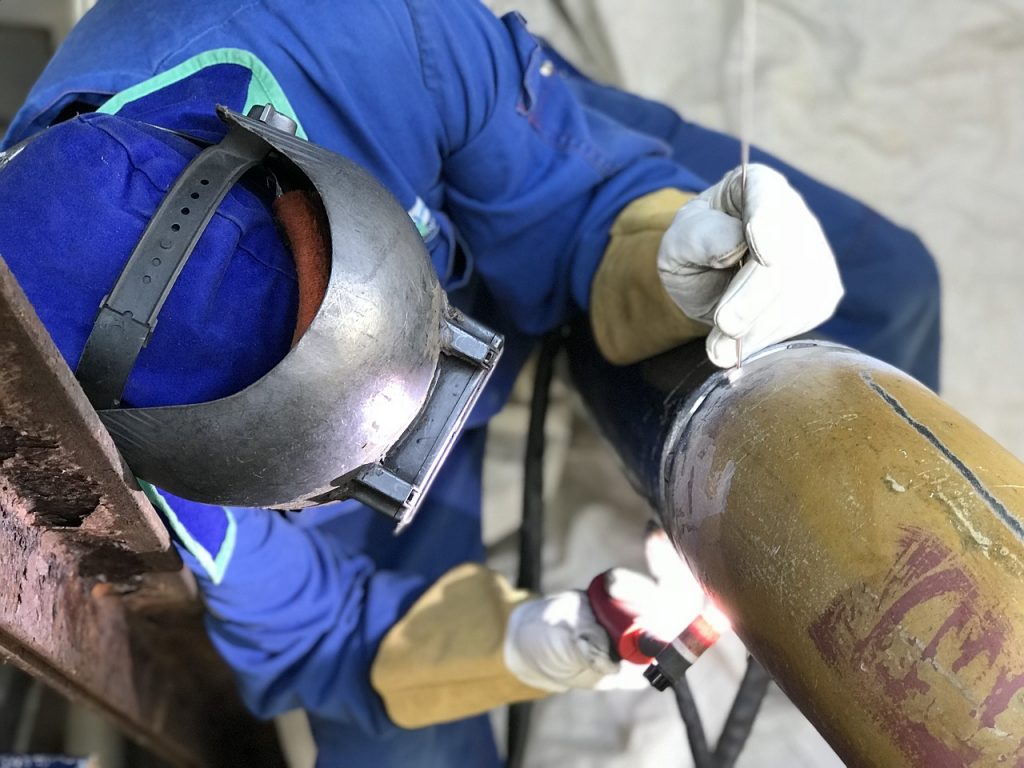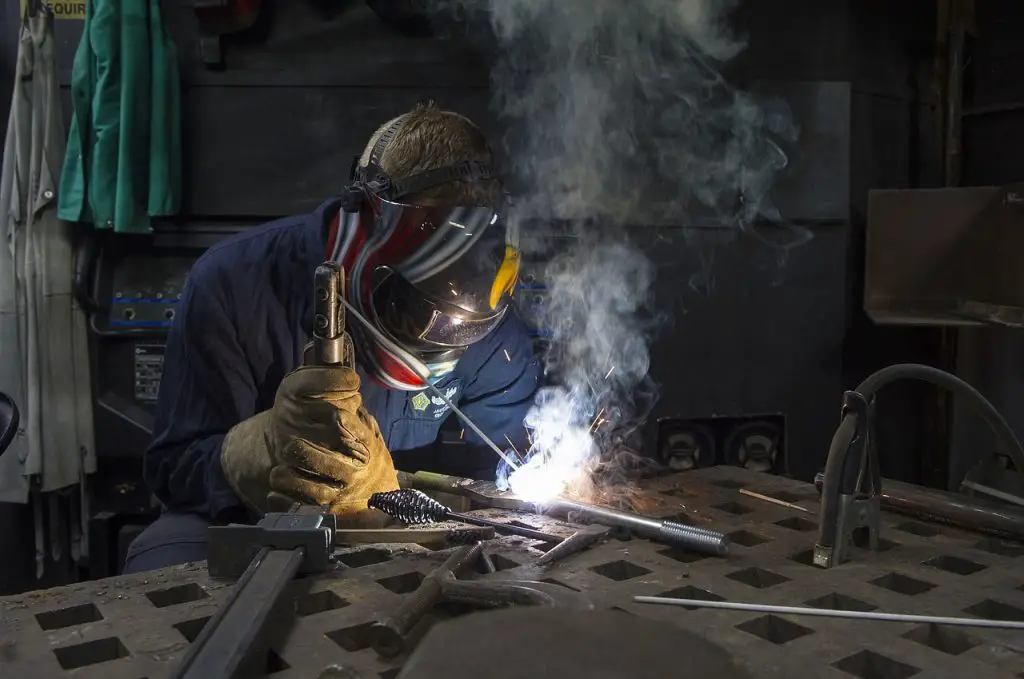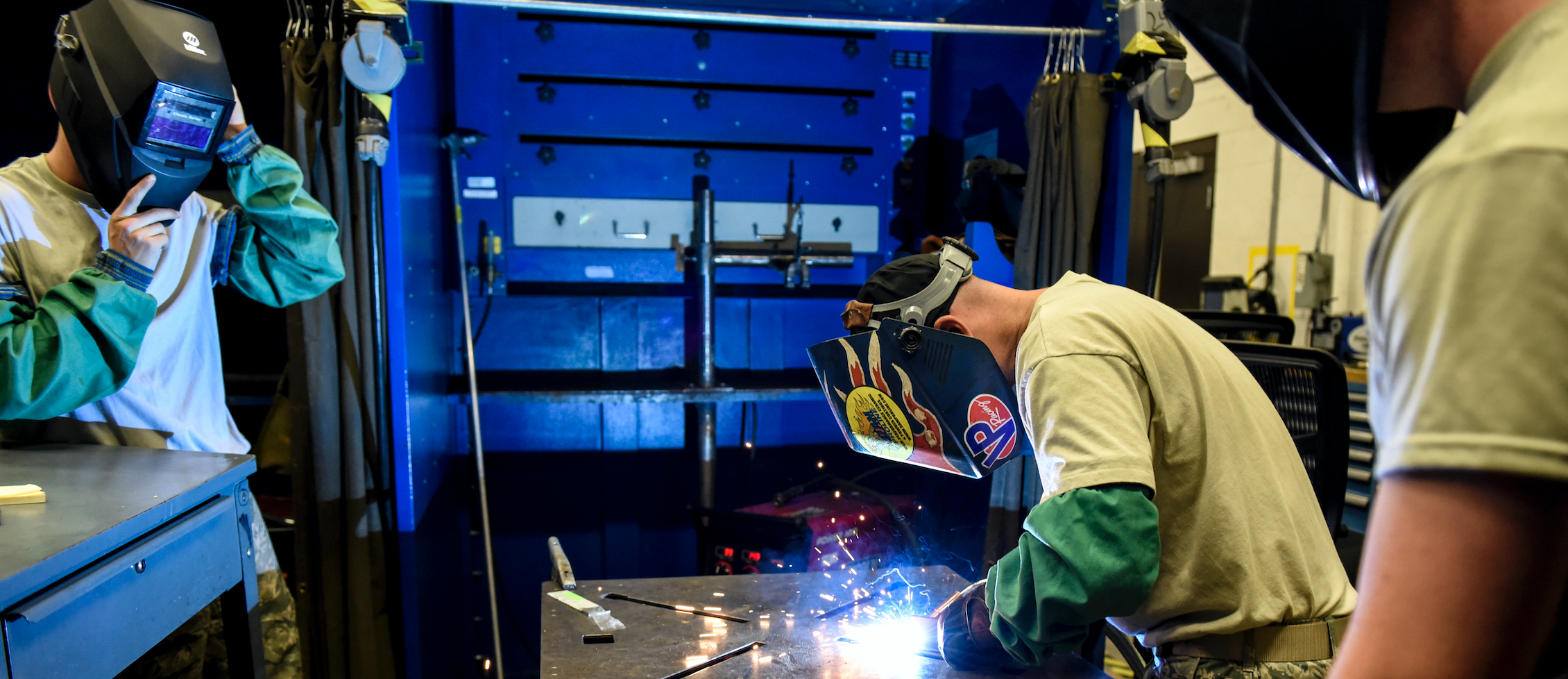Welding Training Info – How To Learn The Trade
This post contains affiliate links.
Welding Training Info
This article will cover welding training info. Welding is a skill that is unique because there are so many ways to learn how to do it. Some of the best welders in the country never went to a welding school. I have also seen mediocre to low grade welders that completed school and got all of their basic certifications.
There are so many niches in welding, and picking a school may be beneficial or it may be quite unnecessary. This article will cover the many outlet options where newcomers can learn to weld, and which one might be the right fit for you.
Apprenticeship
In our opinion, apprenticeships are usually underrated. When a newbie gets an older timer to teach them the trade, it can seem like a daunting road to becoming proficient. However, this route can be super beneficial for the guy/girl who is willing to work at learning these new skills to jump into the career.
These are usually informal situations where a veteran welder might be a family friend or a relative. You may head to their shop after your day job to slowly start learning the trade. This is a great option to start practicing in hopes of leaving your regular job to eventually become a welder. It also means that you won’t be dropping thousands of dollars on tuition for school. You can learn at your own pace and continue building your skill base.
Veteran welders have a vast knowledge base, and young people who are willing to learn can have a ton of potential. Learning from an old timer can really jump start your success and allow you to master things that you have wanted to learn.

Thoughts On Apprenticing
This being said, it is often hard to land a welding apprenticeship. You may not know a welder, so it can be hard to find someone who has the time or interest in teaching you. Most jobs will require AWS certifications and they won’t take on newcomers who have no idea what they’re doing. For this reason, it is hard to land a paid welding apprenticeship at a fabrication shop.
Landing an apprenticeship will require you knowing an experienced welder that is willing to take you on as a student. You may have to buy them a few 6 packs or dinner before they are willing to reveal their knowledge to you. You must also work around their schedule and find time whenever they can fit you in, as they are likely super busy during working hours.
Being an apprentice is usually something that can be done on the side, and it is less of a time commitment than a welding school. The college where I learned welding required 8-hour days all week long. This left me less options for earning money to pay my bills through school. It was a like a full time job, but I was paying them. I was jealous of my friends at liberal arts school who only had 4 hours of class each day.
Welder Helper
This is a position most commonly found on pipeline welding jobs. Helpers will grind beads, prep pipe, and do any task that the welder needs throughout the day. Considering you aren’t a full blown welder yet, these positions usually pay quite well for a young person. Helpers can earn a decent salary during the day, and practice after work to prepare to test out for a pipeline position. Sounds great, right?
The problem is that becoming a helper requires personal connections. You must know a welder who needs a helper, or at least know someone on that pipeline job who can introduce you to key people. These positions are rarely advertised, as the pipeline is a tight knit community. You can’t just show up to the job site expecting to be hired.
Welder helpers who commit and practice can often successfully test out to become a pipe welder. Once they accomplish this, their wage will be in the 6 figure range if they can work steadily throughout the year. A lot of pipeline jobs only last a few months, and you must have the next one lined up to avoid being out of work. This is a tough lifestyle, and requires traveling to different states, and often living in a camper for most of the year.
Being a helper is unusual because you are getting paid while you are learning a lot of things. This gives it an advantage over welding school or becoming an apprentice. Helpers can pay their bills, save for a rig truck, and support their family all while learning valuable skills that could earn them a high paying position in the near future.

Welding School
If you want to become a very well rounded welder in a shorter amount of time, welding school is something to consider. Finding a great school can be tricky, but once you start classes they will take you from an absolute beginner to very proficient.
My school was quite traditional. They saved the welding classes for later, and made us learn oxy fuel cutting and oxy fuel welding before we moved on to MIG, TIG and stick. This encouraged students to do well in the beginning so they could get to the fun stuff later. My first semester was tough because I couldn’t wait to hop on a welding machine.
By the end of the program we were taking AWS tests in Stick, Flux core MIG, and TIG positions. Some students completed the 6G pipe test with a 6010 stick root and a 7018 cap. This is a very advanced test and once completed, it can set you up for a world of job opportunities.
Along the way we also learned aluminum TIG and MIG, Stainless TIG and MIG, carbon arc gouging, blueprint reading etc. We didn’t learn much fabrication, and that was something I picked up later as I entered the work force and started learning more.
Thoughts On School
The full 2 year program was less cash than a traditional bachelors degree, but it still costs quite a bit. Like any college, students will need to consider if taking out student loans is worth it, or if they can learn the skills some other way. Some students will have financially supportive families, while many will not.
Leaving welding school, I was glad to have the certifications under my belt, but I still wanted to learn a lot more. This left me feeling underprepared in terms of landing a fabrication job or a pipe welding job.
I ended up gravitating towards mobile welding, and had a good time running my own business and solving clients metal issues with my knowledge. I was also a single hand welder for a few companies doing ironwork, mezzanine builds etc.

Online
With the vast array of welding videos on youtube, welders today can learn a ton just by watching and practicing at home. A small multi-process welder will cost less than tuition, and could be very beneficial.
I could see how if you’re willing to put the hours in, you could become a solid welder by learning at home. This would be a big commitment, but it could be done. It would also allow you to pick which processes and techniques you like, without having to trudge through every single class at a welding school.
Testing facilities offer paid times where welders can come in and get their certifications. If you worked at it, you could practice at home and then go test out when you felt ready. This would probably be one of the more budget friendly options available. Some of the best welders have taught themselves and they go on to become very successful.
Others may pick up welding as a hobby and then realize that they want to turn it into a career. As you start fabricating projects, you may feel that you can see yourself doing this kind of thing professionally. New welders will usually know pretty fast if they like it or not. If you’re not into it, that will become apparent pretty early on, and that’s totally ok.
Part Time Classes
Some schools and hobby schools will offer shorter classes where students can just learn stick, MIG or TIG. This will shave the cost down and allow you to pick which process you want to get good at. These are often less intense classes, and allow students to get a feel for the trade without going all in. You may go a few times a week in the evening to see how you like welding.
If you don’t end up loving it, at least you’ll have the knowledge to build a few things. Older folks enjoy these informal classes because they can pick up a new skill later in life. A lot of these schools will offer woodworking, ceramics, painting etc. You’ll just have to check your local area to see what institutions are available.
Wrap Up
There is no right or wrong way to learn welding. Like any trade, it might become a career or maybe just a hobby that you do on the side. We encourage you to consider all of the options listed above, and find out which will make the most sense for you.







